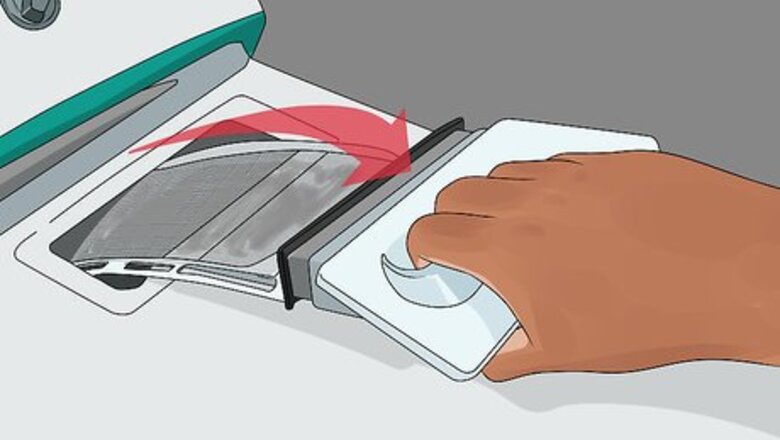
views
Cleaning the Lint Screen
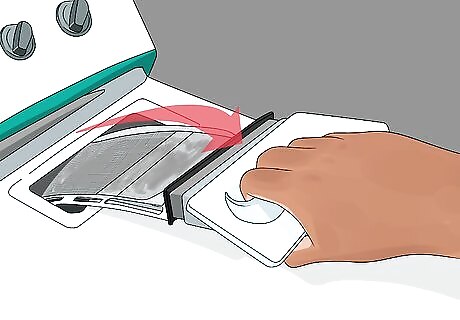
Pull out the screen. Locate the lint screen on your dryer. It may be at the top, on the side, or at the bottom of the dryer door. Check the screen and clean it of lint every time before you place a load inside. Grab the handle of the screen and pull it out until it is fully extended. In most models, you will be able to remove it entirely for cleaning. Only apply gentle pressure when pulling out the screen. You should meet with little to no resistance. If you bend the screen too much, it may not fit back properly into the lint trap area.
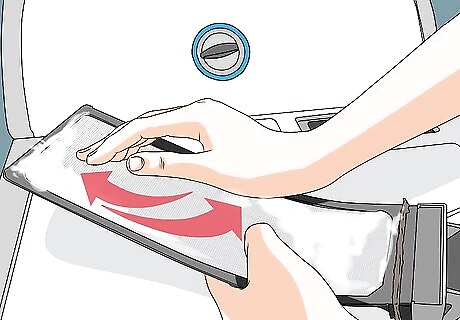
Wipe off the lint with your hands. Run your hands over the screen until you gather a small ball of lint. Then, rub this lint ball across the screen, as it will attract the leftover lint. Keep going until you can see through the screen without any blockages. Toss the gathered lint in the trash. Instead of your hand, rubbing a cleaning brush across the surface of the screen will gather the lint just as well. However, just make sure to discard the lint pulled from the screen, as it could present a fire hazard. Placing a vacuum brush attachment against the screen is another way to remove the lint. EXPERT TIP Kathryn Kellogg Kathryn Kellogg Sustainability Specialist Kathryn Kellogg is the founder of goingzerowaste.com, a lifestyle website dedicated to breaking eco-friendly living down into a simple step-by-step process with lots of positivity and love. She's the author of 101 Ways to Go Zero Waste and spokesperson for plastic-free living for National Geographic. Kathryn Kellogg Kathryn Kellogg Sustainability Specialist Consider composting your lint if you wear clothing made of natural fibers. If you're drying natural fibers like wool, cotton, hemp, bamboo, viscose, or tensile, your dryer lint will be compostable, because it's cellulose-based. However, if your clothes are made of polyester or acrylic, your dryer lint will be plastic, so it's not compostable.
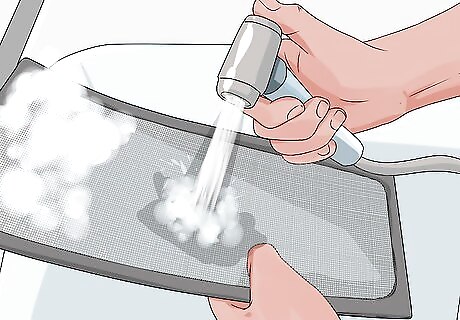
Rinse the screen off with water. After you’ve pulled the screen out all the way, remove the extra lint and then run it under some water in the sink. If the screen is especially dusty, apply a bit of soap to the surface as well. Keep rinsing until the screen is clean and clear. It is not necessary to complete the step after each load, but it is a good idea to do a rinse every few weeks. This is especially the case if you use dryer sheets, as they can leave a residue on the screen’s surface.
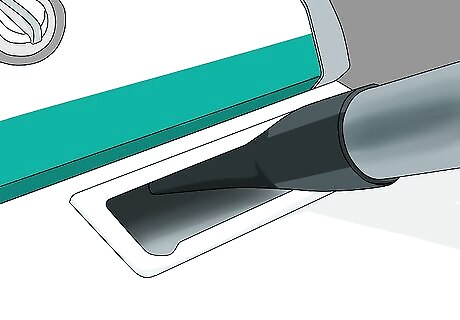
Vacuum out the screen vent. While the screen is out, peer into the lint trap. If you see any extra lint or debris, get out the extended vacuum attachment. Stick this attachment into the trap area, turn it on, and remove any materials present. Taking this extra step may prevent a clog from forming in the trap area.
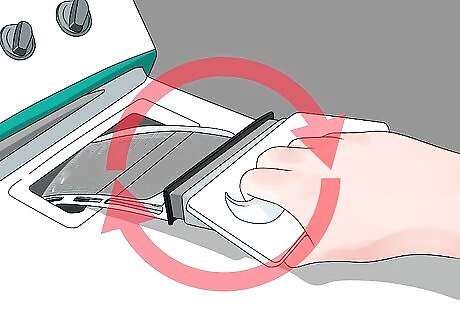
Repeat after each use. Before you place a fresh load into the dryer, make sure to fully clean the screen and trap. This will help to keep lint and debris from making its way further into the machine. It might be easy to ignore the practice for smaller loads, but continue with it regardless of load size.
Completing a Deep Clean of the Vents
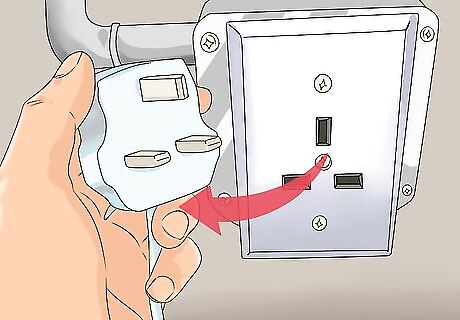
Unplug your dryer. Reach around to the back of your dryer and detach the power cord. It is necessary to cut off the electricity to your dryer at this point, as you will be moving the machine around and possibly opening up some of the interior panels.
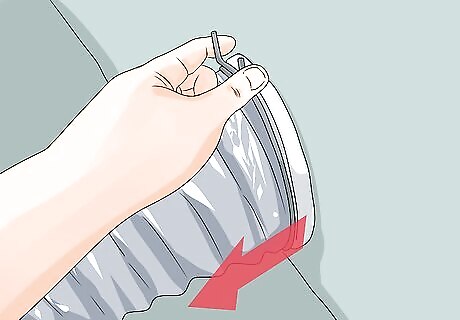
Remove the exhaust hose. Shimmy the dryer away from the wall and look at the back of the machine. Locate the exhaust hose and loosen it from dryer by loosening the outward “o-ring” clamp. You may be able to simply squeeze the clamp to remove it, but other styles require that you use a screwdriver to loosen a bolt at the center of the clamp. Pull the hose away from the dryer and from the wall port. Make sure to loosen the clamps on both sides of the hose prior to trying to remove it. Otherwise, you could damage the connection to the port and make it more difficult to replace afterwards. Most clamps require a flathead screwdriver for the bolt. You may want to call in an appliance professional if your dryer connection is older and connected to gas. Moving around the machine could cause gas leaks.
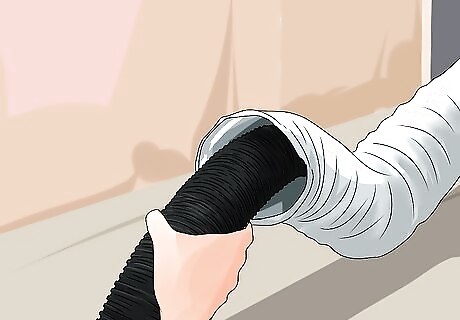
Empty the exhaust hose of any lint. Once the hose is fully removed, take it to a well-lit area and look inside. You will likely see lint balls of various sizes. Take a cleaning brush and gently wipe off the interior. Or, stick your vacuum attachment inside and suck out the lint. Set the newly cleaned vent aside.
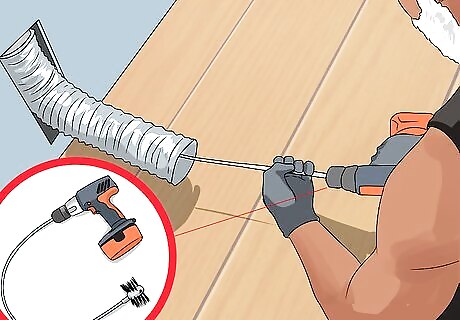
Feed a cleaning rod into the wall vent. Purchase a vent cleaning rod or kit at your local home improvement store. This kit will contain a brush attached to an extended arm that is then connected to a drill or used alone. Following the package’s directions, slowly feed the brush into the vent. Continue to gently push, rotating as needed, until you’ve cleaned the entire inside of the vent. Rotate and spin the brush multiple times in order to get the most lint out. Also, pull the brush out of the vent entirely multiple times and clean off any accumulated lint before reinserting it.
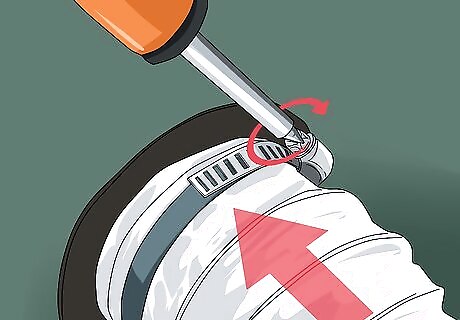
Reattach the exhaust hose. Get behind the dryer and place the exhaust hose back into position. Use a screwdriver or your hand to tighten the clamps. Plug your dryer back in and check to see if any hot air is escaping from the sides of the vent. If so, check your clamps once again. If not, push your dryer back into position against the wall.
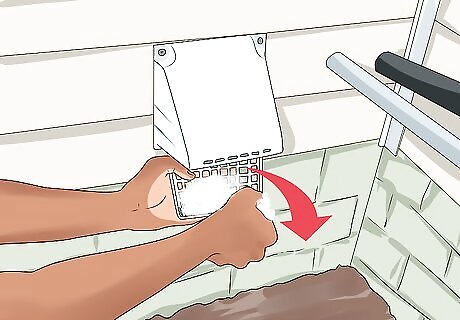
Remove lint from the exterior vent. Locate your vent on the outside of your home. It should be a square exit point covered by a plastic or metal screen. Remove the screen and set it aside. Reach inside the vent with your hand and gather any lint sitting nearby. Then, use a small vacuum or brush to clean out the lint a bit deeper inside. Make sure to carefully re-secure the vent in order to keep any pests at bay.
Completing a Deep Clean of the Interior Dryer
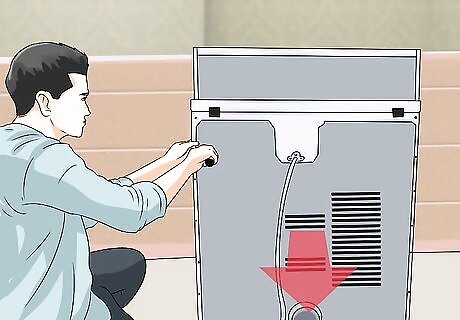
Take off the panel. Turn off your dryer and slide it away from the wall. Go behind your dryer and unscrew the back access panel. Some dryers have a top access panel, but the cleaning process works the same way. Open the panel and then wipe off all visible areas.
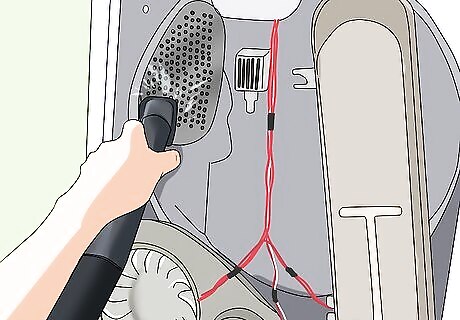
Vacuum and wipe off all exposed areas. Look inside the dryer and use your hands or a vacuum to pick up any visible lint, dirt, or debris. Pay particular attention to the areas surrounding the exhaust vent. Clean the area surrounding the heating element, but be gentle and careful when handling or moving wires around. If you chose to wipe down any metal parts, feel free to use a standard all-purpose cleaner paired with a microfiber cloth.
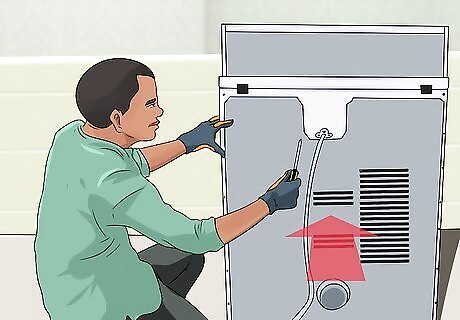
Replace all parts. Once you are satisfied that the interior is clean, slide the panel back into place and secure it with the screws. Push the dryer back against the wall and plug it in again. Do a quick dry cycle just to make sure that everything sounds okay.
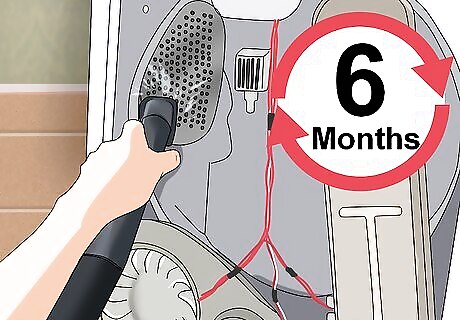
Deep-clean the interior and vents every 6 months. Perform a cleaning sooner if your dryer feels very hot while running or if your clothes seem to never get fully dry. These are all signs that your dryer could be suffering from a lint blockage.

Call an appliance repair man. Use a search engine to locate an appliance repair specialist near you and make an appointment. They can follow the manufacturer’s directions to ensure that your machine is serviced properly without voiding the warranty. Before you schedule when them, ask if they will clean out and service your exterior vent, as some repairmen do not include this service unless specifically requested.




















Comments
0 comment